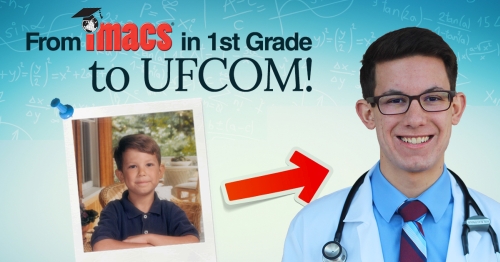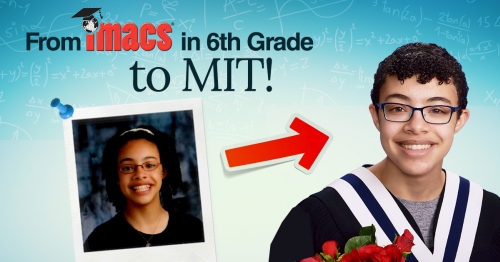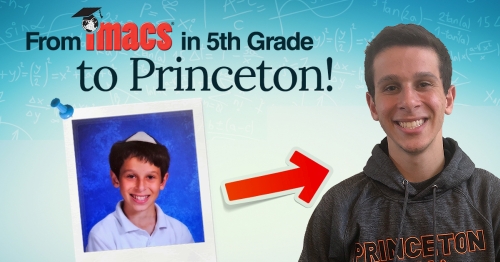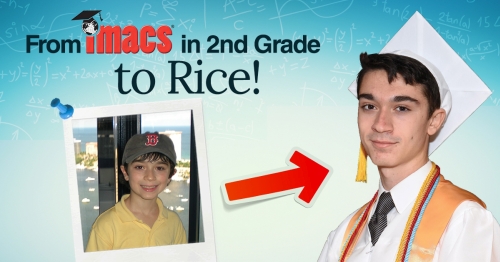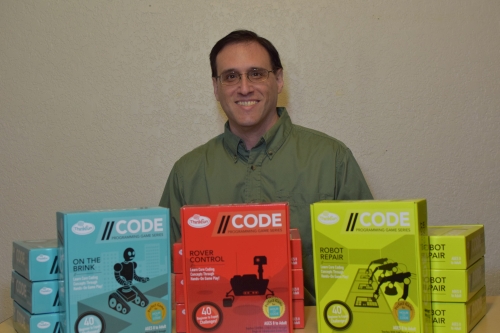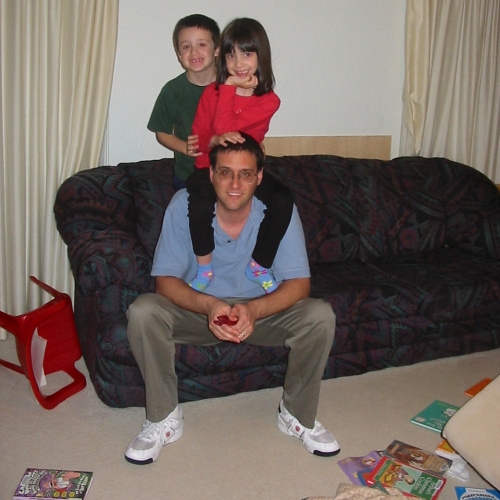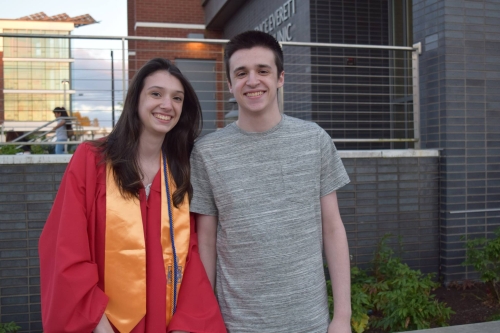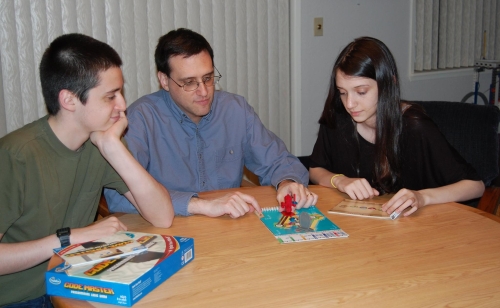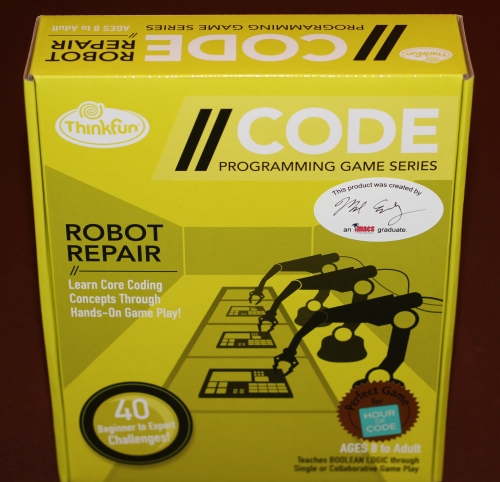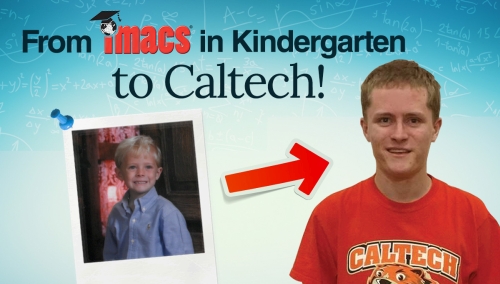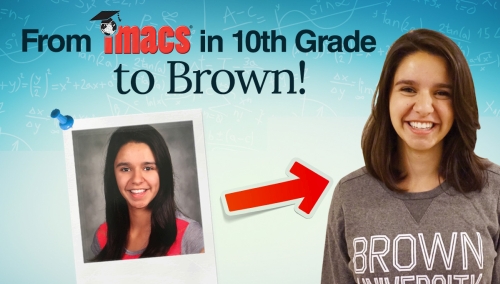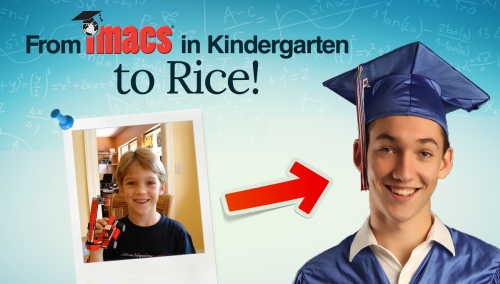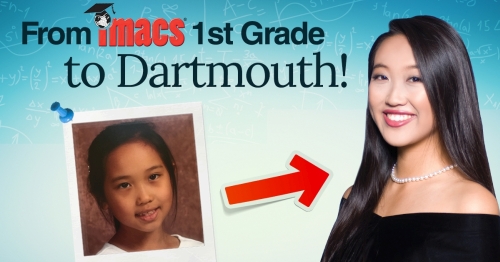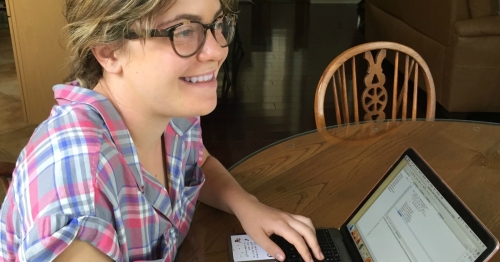
Nik attended IMACS from 1st through 12th grade and completed Math Enrichment, Computer Enrichment, Hi-Tech Summer Camp, and university-level courses in Computer Science and Logic for Mathematics. He earned straight A’s in high school, scored 790 on the math section of the SAT, and was named a National AP Scholar after scoring 5’s on 13 AP exams. He also happens to be a virtuoso pianist.
Nik chose the University of Florida’s Honors Program where he was selected as a Stamps Scholar in recognition of his exceptional success in leadership, service, and academics. As an undergraduate in UF’s Biomedical Engineering program, he completed research in both biomedical engineering and gastroenterology while maintaining a perfect 4.0 GPA.
Nik was accepted into the UF College of Medicine’s highly selective Medical Honors Program. In only his first year of medical school, he served as the Operations Coordinator for Gainesville’s Equal Access Clinic, the largest free clinic in the country run entirely by medical students. Nik will earn both his B.S. and M.D. degrees in seven years after which he plans to complete his residency in internal medicine and then specialize in cardiology.
“Logical reasoning and critical thinking are applicable both within and outside of mathematics. As a medical student, I use these skills every day to efficiently diagnose and effectively treat patients. I credit my many years at IMACS for growing these skills to their fullest potential.”
Congratulations, Nik!
Shuli started taking IMACS courses in 6th grade after winning a scholarship to University Computer Science I through a coding camp for girls. She went on to complete University Computer Science II, AP Computer Science: Java Programming, and Logic for Mathematics. Shuli graduated high school with a near-perfect average of 98 and was named a National Merit Finalist. She scored a 5 on the AP Computer Science A exam and 1560 on the SAT, including 800 on the math section.
Shuli is a true Renaissance woman who competes in a wide variety of academic competitions. She and her teammates dominate the Canadian high school quizbowl circuit, most recently winning the prestigious Reach for the Top National Championship. At the annual Ontario Student Classics Conference, Shuli was named the Top Academic Pentathlete in each of her four years of high school and Top Academic Student in her senior year.
Shuli was accepted to MIT, Harvard, and Stanford. She chose MIT where she plans to major in Mechanical Engineering or Computer Science and minor in Classics.
“IMACS gave me such an early understanding of computer programming and logic that today, complex programming concepts are simply part of the way I think. This now-innate ability helps me succeed in all of my STEM classes and is something I would not have been able to learn anywhere else.”
Congratulations, Shuli!
Ty started taking IMACS Math Enrichment classes in 5th grade and went on to complete IMACS’ university-level courses in Computer Science and Logic for Mathematics. Ty cultivated a love for problem-solving and analytical thinking in high school, greatly enjoying AP Mathematics and Physics courses while applying those skills to creative outlets such as the advanced study of the Talmud (Jewish Oral Law).
As a student-athlete, Ty was a leader in the classroom and on the field. He and his teammates won the Technion’s 2017 Rube Goldberg Machine Challenge, an international competition, for which they were awarded one-year full scholarships. Ty’s pioneering performance in an independent course on Multivariable Calculus led his high school to establish a program allowing highly advanced students to study this challenging subject. A varsity soccer player for four years, Ty won MVP honors in 11th and 12th grade and was named a captain of the team in his senior year.
Ty was accepted early decision to Princeton University where he will major in Operations Research and Financial Engineering after taking a gap year to study abroad.
“IMACS taught me to simultaneously think critically and creatively, imbuing me with skills that assisted me throughout high school and played a fundamental role in my decision to pursue data analysis at Princeton University.â€
Congratulations, Ty!
Ricky first attended IMACS in 2nd grade. Over the next 10 years he completed all levels of Math Enrichment and Computer Enrichment, Electronics, and university-level classes in Computer Science and Logic for Mathematics. Having scored 1580 on the SAT, 35 on the ACT, 800 on the SAT II subject tests in Math and Chemistry, and 5’s on AP exams in Calculus AB, Calculus BC and Chemistry, Ricky was named a National Merit Finalist and National AP Scholar.
During high school, Ricky channeled his talents and sharp focus through both academic and athletic endeavors. He qualified for the prestigious American Invitational Mathematics Examination, and he and his teammates competed in the Barry University Olympiad tournaments, earning 1st place team wins in Math and Chemistry. Ricky also works on developing ways to use computer programming to enhance research, as well as striving to improve his personal best times in track and cross-country.
Ricky was accepted at Rice University, University of Florida, University of Miami with a Singer Scholarship, and University of Southern California with a Presidential Scholarship. He chose Rice where he will major in Computational and Applied Mathematics followed by a Ph.D. and career in research.
“Taking IMACS classes from a young age gave me a clear advantage in math and computer science, but it also helped me excel in all other fields. I am able to approach complex problems with confidence because of what I learned at IMACS.”
Congratulations, Ricky!
The IMACS Blog reconnects with alumnus Mark Engelberg who recently released three new coding games through ThinkFun and Target. (Win an autographed copy of one of Mark's new games!) Mark's passion for computer science, math and logic led him to an award-winning career in puzzle and game design. He is also an active speaker in the Clojure programming language community. In this post, Mark talks with IMACS about what it was like to be a homeschool dad to two amazingly talented children who are now accomplished young adults in their own right.
First, tell us about your new ThinkFun games.
Two years ago, I invented a programming puzzle game for ThinkFun called Code Master. Code Master was a commercial and award-winning success, so ThinkFun asked me to develop a new line of puzzle games, where each game would highlight a specific underlying principle of computer science. The new line of games is called the //CODE Programming Game Series. To design the games, I started from a list of concepts I wanted players to encounter, and kept trying out ideas and tinkering with the rules until I felt I had a combination of mechanisms that covered those concepts and was fun to play.
The first game in the series, On the Brink, is an introduction to procedural abstraction — the idea that we're not just writing programs to solve a one-off task, we're building components that solve multiple instances of an underlying problem, and then using those components to build higher-level components, and so on. The second game, Rover Control, focuses on the essential skill of stepping through programs in your head and visualizing the outcome, particularly with flow control constructs like if-then-else statements, while loops and for loops. The third game, Robot Repair, is all about Boolean logic. When developing Robot Repair, I leaned heavily on the material that I learned as a child in IMACS' Advanced Mathematical Logic courses. I think students in your Logic courses are really going to enjoy Robot Repair. Like their predecessor, Code Master, all three of the new games are "unplugged" computer science board games that come with a book of puzzles for solo or cooperative gameplay.
You are also a parent of two gifted children who are now ages 19 and 17. About how old were Alex and Molly when you first suspected that they were gifted? What were the signs?
I was a stay-at-home dad, and when Alex and Molly were toddlers, I taught them to read and write and gave them daily math lessons. Honestly, I mostly did those things to keep myself from getting bored; it was fun for me to feed their intellectual curiosity. My wife did the same with the kids when she was home from work. That was just our parenting style. We wanted the kids to have the opportunity to learn these core skills as soon as they were capable, and the easiest way to achieve that was to throw a lot of educational activities at them early, just to see what would stick. As it turned out, more of it stuck than we expected!
I didn't really have much to compare their development to until the day I went to Alex's kindergarten orientation. As the teacher explained what the students would be doing in the coming year, it dawned on me that my kids had already done those things. I realized that I had inadvertently given my kids a big jumpstart, and what I had been doing was working, so I might as well keep doing it. And that's how I ended up deciding to homeschool my kids.
Because I homeschooled my kids, the label "gifted" didn't really come into play. I never needed to get them tested, or prove anything to a school official. But it was clear to me that they had the capacity to learn faster than what our school system provides, so I set out to do my best to keep them challenged and allow them to fully develop their individual talents.
How did you feel when you knew for certain that they were gifted?
It felt like a tremendous responsibility to help them achieve their full potential, even more so because I was choosing to take on that responsibility myself rather than relying on the school system. If things didn't work out, I would have no one to blame but myself. It was a lot of pressure. I didn't really doubt my capability to teach them, but I knew it would be an enormous undertaking, one that would require the bulk of my time and attention for nearly 20 years. It was well worth it — I'm so proud of the young adults they've become — but I'm relieved to have reached the point where that responsibility is behind me rather than in front of me.
As you looked into ways to meet their educational needs, what did you discover?
One pleasant surprise was realizing that it isn't necessary to be an expert in everything in order to meet your kids' educational needs. In many cases, it's more about playing the role of an advocate, connecting them up with the right resources. I would track down private teachers, public school classes, homeschool co-op classes, other parents, books, videos, and websites for the areas I was less equipped to handle. I did my part for the homeschooling community by serving as a teacher of math and computer science for many other talented kids whose parents were not as adept at those particular subjects.
What were some of the programs, opportunities or approaches that you found helpful in making the most of their talents and interests?
One of the things that was really important to me was to make sure my kids had a strong foundation in math and computer science. Fortunately, I have the advantage that I learned the IMACS curriculum when I was in middle school and high school. This made it easy for me to teach these subjects because I'd already experienced first-hand what a top-tier math and CS education looks like. To duplicate that experience for my kids, I simply taught them using the same materials and techniques that I had learned at IMACS and in college. Those resources played a big role in giving me the confidence to homeschool.
What were some of the benefits and challenges of homeschooling? How did you deal with the challenges?
One of the biggest challenges of homeschooling is that it takes effort to find a community to be a part of. We are fortunate that here, where we live in Seattle, there is a robust homeschooling community and we were able to find a group that fit our personalities and make many dear, lifelong friends. Once we found the right community for us, those rich social interactions became one of the biggest benefits of homeschooling. Our weekly park days remain some of my most cherished memories.
Another big challenge is that, even though my kids are close together in age, they were far enough apart that I couldn't do the same lessons with them. I always felt like I was struggling to give each of them the level of individual attention I wanted to give them. My solution was to make certain parts of the day relatively structured and leave the other parts of the day flexible so that I only needed to schedule the structured parts. For example, I might be doing structured math lessons with one child while the other was doing creative writing or watching an educational video, and then switch.
What were some other challenges you faced in parenting gifted children, and how did you deal with those?
Gifted children can be wildly asymmetric in their abilities, and wildly different from one another in terms of their talents and interests. It was a constant challenge to avoid getting impatient when one of my children would struggle with a concept that came naturally to the other. I had to keep reminding myself that it was totally normal for them to have different strengths and weaknesses.
How did being a gifted adult who was once a gifted child affect your educational and non-educational parenting choices?
This was especially helpful when my kids' interests dovetailed with my own. My son, for instance, developed a keen interest in programming, and thanks to my own background, I knew exactly what to do to support him in that interest. When my kids' interests and abilities diverged from mine, it was a lot tougher, and I ended up doing what any parent would do … seeking out people and resources that could help my kids develop their talents.
What are your fondest memories of raising Alex and Molly?
Probably my fondest memories are the many times we played board games together over the years. For those moments, instead of having a parent/child relationship, or a teacher/student relationship, we were just people playing games together and enjoying each other's company. I feel like at those moments, I really gained some insight into their character, and got a glimpse of what they would be like as adults.
What are your hopes for them in the future?
My hope has always been for them to be good, caring, compassionate, independent, happy adults. The good news is … they already are. I'm done! Woohoo!
Robot Repair was inspired by Mark's study of the IMACS’ Advanced Mathematical Logic curriculum.
Residents of the continental United States are eligible for the Robot Repair Raffle. The autographed copy of Robot Repair will be shipped only to an address in the continental US. To enter the raffle, complete the following steps:
- Parents must register their child to take either the EMF Aptitude Test (ages 10-14, approximately) or the eIMACS Aptitude Test (ages 14-18, approximately).
- On the aptitude test online registration form, type "IMACS Blog" in the box for "How did you hear about us?" or "How did you hear about IMACS?".
- Have your child take the aptitude test for which he or she is registered. The test must be taken during the period October 1-30, 2017. (No minimum test score is required to qualify for the raffle.)
RJ was an IMACS student from kindergarten through 12th grade and took every class IMACS offered, including all levels of Math Enrichment, Computer Enrichment, Hi-Tech Summer Camp, University-Level Computer Science, AP Computer Science: Java Programming, and University-Level Logic for Mathematics.
With a 5.9 GPA and 2360 on the SAT, RJ graduated as co-valedictorian and was honored as a US Presidential Scholar candidate, National AP Scholar and National Merit Scholar. He and his teammates were also four-time Science Olympiad state champions.
RJ was accepted to Caltech, Georgia Tech, Carnegie Mellon, and the University of Florida. He chose Caltech where he took junior-level Computer Science classes as a freshman and served as a Teaching Assistant for those classes as a sophomore. RJ conducted summer research in computer vision and was selected for an internship at Northrup Grumman. He will graduate with a double major in Computer Science and Philosophy and plans to attend graduate school to specialize in Machine Learning.
“IMACS taught me an organic approach to problem-solving, a way of thinking that demonstrates the necessary rigor required to solve genuinely challenging problems. The introduction to proofs and logic that I got at IMACS was absolutely critical to my success at Caltech.”
Congratulations, RJ!
RJ Antonello
Cori wanted to understand the fundamental concepts that make up the sophisticated theories of Computer Science. She started IMACS during the summer before tenth grade and went on to complete IMACS’ University Computer Science track and AP Computer Science: Java Programming course. Cori scored a 5 on the AP Computer Science A exam, 800 on the math portion of the SAT, and was named a National Merit Scholarship Finalist.
Cori’s keen interest in using her knowledge to understand real-world problems inspired her to write a Naive Bayes machine learning algorithm to detect political bias in online news articles. Her paper on it was selected for presentation at the Georgetown Junior Science and Humanities Symposium, and she was honored as an affiliate winner for the National Center for Women and Information Technology’s Aspirations Award.
Cori chose Brown University where she was accepted early decision and plans to study Computer Science and Economics. She hopes to pursue a career applying data science within education or a service-based field.
“IMACS turned the slightly enigmatic, ever-changing field of Computer Science into a never-ending set of fun puzzles for me to solve. It brought to my attention the intricacy and beauty of the field while illustrating how I could become a part of it.”
Congratulations, Cori!
As a young child, Mason excelled in IMACS Math Enrichment classes and, in subsequent years, attended several weeks of IMACS summer camps. He later completed IMACS’ university-level courses in Computer Science and Logic for Mathematics. Mason was honored by the College Board’s National Hispanic Recognition Program for his achievement on the PSAT/NMSQT, and his high school mathematical modeling team was recognized by the Consortium for Mathematics and its Applications. Mason graduated high school with a perfect 4.0 GPA and 34 on the ACT.
A natural at sharing knowledge, Mason enjoys tutoring students in science and math at a local homeschool co-op, co-taught a robotics class for two years, and was a Teaching Assistant for an Honors Calculus seminar. He accomplished this and more while being an all-county varsity and travel soccer player and a dual-enrolled student at a regional 4-year university.
Mason chose Rice University where, at 16 years old, he was accepted early decision into the George R. Brown School of Engineering. He plans to major in Materials Science and NanoEngineering.
“My early exposure to IMACS provided me with a unique foundation in logic and mathematics that helped me succeed in advanced STEM classes at a very early age. I understand numbers intuitively and am able to solve complex problems in my head thanks to my IMACS training.”
Congratulations, Mason!
Snow began IMACS in 1st grade and completed all levels of IMACS Math Enrichment. She returned during high school to complete the IMACS University Computer Science track. Snow’s talents and keen interest in programming, civics, and service propelled her to 1st place finishes at FIU’s Google Startup Competition, Ft. Lauderdale’s Code for America Civic Hackathon, JusticeHack Miami, and Yale’s Bulldog Invitational Mock Trial Competition.
In addition to being selected as a National Merit Finalist, Snow was named Cadet of the Year by the Florida Wing of the Civil Air Patrol and won 1st Place at the National Cadet Special Acts Competition. Snow credits IMACS for the way she thinks and approaches every aspect of her life.
With a 5.5 GPA, 1580 out of 1600 on the SAT, and 800 on the SAT Math II exam, Snow was accepted at Dartmouth, UC Berkeley, NYU, Vanderbilt, Wellesley, and the University of Miami. She chose Dartmouth where she plans to double major in Computer Science and Economics and eventually pursue a career in cyberlaw or cybersecurity.
“IMACS is the one place that doesn’t teach you steps to get to a specific solution but rather how to use logical and creative thinking to develop your own solution. It is the embodiment of everything learning should be.”
Congratulations, Snow!
This month's IMACS blog post is by guest author and eIMACS student, Naomi Spargo. Naomi recently sent us the following letter and kindly agreed to let us share it with our blog readers. Learn more about the eIMACS online courses that helped Naomi develop a passion for math and computer science and be prepared for a summer program in Artificial Intelligence at Stanford.
Dear IMACS,
I recently got back from the Stanford Pre-Collegiate Summer Institutes program and wanted to let you know that it was absolutely amazing! It was very intense, but I also learned a ton. I learned about all the different techniques that fall under the umbrella of artificial intelligence such as machine learning, neural networks, and search algorithms. (I found the search algorithms that I learned in eIMACS very helpful.) I also learned answer set programming, which had a very steep learning curve for most of the class because they had never encountered formal logic before. I was at a big advantage because of the logic classes I took with eIMACS.
Other than a more sophisticated approach to coding, what I took away from Stanford was a better understanding of how sprawling of a field computer science is. I've always approached coding in a very mathematical manner because mathematics has always been my strongest area of expertise. At this camp, I encountered many other coders that aren't particularly strong in math but have a heavy background in something else, like robotics.
The way we approach problems is extremely different. Depending on the problem, my approach works much better than theirs or vice versa. There are so many different fields within computer science; each field lends itself to a different type of mind. I now see the need to specialize within computer science, perhaps on data analysis or cybersecurity (both math-heavy fields).
I also wanted to take this opportunity to thank you for making advanced coursework available and enjoyable for young people like me. Your courses have been a godsend in three primary areas:
1. They helped me develop a passion for math/computers.
I had a strong dislike for math classes before I took your courses because the way math is taught in schools is very dull. My biggest frustration with school math classes was how shallow the content was; we were essentially being taught to memorize symbols. Only occasionally were we offered a real understanding as to how the symbols connected. I hungered for deeper meaning in mathematics, and was doing my best to figure it out myself.
The only math I enjoyed was the work I did myself with a store-bought textbook and a calculator. I didn't associate the math I did with any structured "class" because every class I had taken was slow, boring, and surface level. I was excited to learn, but my approach to learning was unorganized and inefficient. There is only so much an eleven year old can do on their own.
eIMACS was a huge assist in this. Your courses explain everything in approachable language so I was not intimidated away as a young child, but gave me the deep understanding that I wanted. The content is presented in an interesting manner. The material was clearly written by someone who loves what they are doing, and the instructors who helped me with my questions share this attitude. This passion translated to me; I no longer felt alone when it came to my love of math. eIMACS courses pull off a rare trick in education; they explain complicated ideas to 11 year olds without sacrificing complexity. Your courses are comprehensive; you leave no questions unanswered. I enjoyed them more than anything I have taken in high school.
2. They gave me a competitive edge in nearly every subject.
It is self evident that the three computer science courses I took with you helped me with coding. The diversity of languages you offer is a huge benefit, because certain languages lend themselves to certain problems. At Stanford, the AI class teamed up with the cryptology class to crack some numerical-based codes. Haskell, which I knew thanks to you, particularly lends itself to interpreting numerical data, so I could crack the codes much faster than students who were confined to object-oriented languages like Java. You also gave me experience with complex data structures, which most coders my age have not encountered.
Similarly, the logic I have taken with eIMACS helped me with math. I often reference my tautology template when proving theorems. It gives me an organized way to express my theories and postulates. I see logic as a honing device for mathematical thought. However, the reach of these courses goes far beyond math and science. My English essays (especially the persuasive ones) often employ tautologies written out in prose form. Logic has made my writing more coherent and streamlined; it has improved my word economy because I can organize my thoughts more efficiently.
My strong foundation in logic has also made me a more persuasive speaker. I do a form of debate called extemporaneous speaking, where I have thirty minutes to prepare a seven minute persuasive speech about a current political topic. Because my time allotment is so small, I need to break down complicated economic and political concepts quickly so that the average person can understand them. Using rules of logic is an excellent way to do this. My debate coach has told me I have "logos for days"; I directly attribute this to my eIMACS courses.
3. They allowed me to specialize on what I truly loved earlier than most students.
eIMACS courses are so much more advanced than what most high schoolers are exposed to. I know much more about the fields I'm passionate about and can specialize sooner as a result. Most kids my age have no idea what they want to major in. Because of IMACS, this is not the case for me.
I feel very fortunate to have taken eIMACS courses and am thankful to all my IMACS instructors for inspiring and encouraging me. I know that my eIMACS background has prepared me well for college and whatever I decide to do after, and I feel confident that the way of thinking logically that I learned in eIMACS will help me face any challenge.
Sincerely,
Naomi Spargo
Older Posts »







